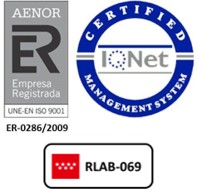 The Service of Protein Chemistry at the Margarita Salas Center for Biological Research (CIBMS) offers scientific and technical support in the protein investigaton to any research laboratory from public research organisms or private companies. In the Service it can be performed separation, quantification, identification and characterization of proteins by chromatography techniques, amino acid analysis, amino terminal sequencing, LC-MS and isothermal titration calorimetry. Additionally, the facility provides peptide synthesis and purification.
The Service of Protein Chemistry at the Margarita Salas Center for Biological Research (CIBMS) offers scientific and technical support in the protein investigaton to any research laboratory from public research organisms or private companies. In the Service it can be performed separation, quantification, identification and characterization of proteins by chromatography techniques, amino acid analysis, amino terminal sequencing, LC-MS and isothermal titration calorimetry. Additionally, the facility provides peptide synthesis and purification.
Since 2011 the laboratory is certified according to UNE-EN ISO9001:2015 with ER-0286/2009 AENOR certification code in "Automated amino acid analysis using post column ninhydrin derivatization" and "Automated protein sequencing by Edman degradation chemistry" field of activities. In February 2025, the Facility became a member of the network of Laboratories and Scientific and Technical Infrastructures of the Community of Madrid (REDLAB), with the assigned registration number RLAB-069.
SERVICES AND TECHNIQUES OFFERED
Protein Sequencing. Identification of cleavage sites resulting from proteolytic degradation, confirmation of the correct N-terminal expression in recombinant proteins, design of oligonucleotides for cloning, identifying proteins in databases, verification of sequence and purity of a synthetic peptide, quality control.
Amino Acid Analysis. Estimation amount of peptide/protein, concentration of protein/peptide solution and degree of purity, identification and estimation of modified or unusual amino acids, confirmation of correct recombinant protein expression, estimation cysteine content of a peptide/protein, determination and estimation specific free amino acids in media and solutions, determination physiological amino acids in biological fluids.
Peptide Synthesis. The application of peptides are vast and ever-growing, including research in structural biology and disease pathogenesis, antibody generation, vaccine development, drug discovery and development, immunotherapy and food industry.
High-Performance Liquid Chromatography (HPLC). The facility offers multiple liquid chromatography systems that support a wide range of scales: analytical, semi-preparative, and preparative. The facility provides assistance and consultation for equipment usage and method development tailored to each user's specific applications.
Isothermal Titration Calorimetry (ITC)
Determination of protein interactions with other biomolecules, study of interaction specificity between proteins, confirmation of drug candidate binding to target proteins, analysis of changes in ligand binding affinity due to mutations or target protein variability, study of cooperative and/or allosteric regulatory interactions.
Liquid Chromatography Coupled to Mass Spectrometry (LC-MS). Determination of synthetic peptide purity, quantification of drug candidate compounds and related substances, verification of purity of synthetic pharmaceutical products.
The nature of samples analyzed by the facility is highly diverse and includes proteins, peptides, synthetic pharmaceutical compounds, culture media and solutions, animal feed, products for human consumption, and biological samples of all kinds (physiological fluids, extracts of animal and plant origin, hair, silk, pollen, etc.).
FACILITY EQUIPMENT
-
Protein sequencer (Applied Biosystems, Procise 494). The Procise 494 Protein Sequencer performs automated Edman sequencing chemistry.
-
Amino acid analyzer (Biochrom 30). The Biochrom 30 uses the classical amino acid analysis methodology based on ion-exchange liquid chromatography and postcolumn continuous reaction with ninhydrin to provide qualitative and quantitative compositional analysis. Sensitivity is ∼10 pmol.
-
Peptide synthesizer (AAPPtec, Focus XC). The Focus XC can synthesize up to six peptides simultaneously at scales from 0.05-5 mmol, using Fmoc chemistry.
-
HPLC: ÄKTA basic (Amersham Pharmacia Biotech) and Agillent 1200 preparative purification platform.
-
MicroCal PEAK-ITC isothermal titration calorimeter (Malvern Panalytical). This technique enables cuantitative determination of binding constants, reaction stoichiometry, enthalpy and entropy when two molecules interact.
-
LC-MS. Single quadrupole mass analyzer (Agilent, MSD XT) with on line HPLC Prime 1260 Infinity II (Agilent) equipped with quaternary pump, vial autosampler with integrated sample thermostat and photo diode array detector.
Instructions
Users interested in using the Scientific Service of Protein Chemistry can contact in the email address qproteinas@cib.csic.es or by phone 918373112, extension 442694.
All samples must be accompanied by a fully completed sample submission form, otherwise samples will not be processed. The forms are available on this website and can be sent electronically or preferably printed, signed and enclosed along with the sample.
Before shipping the samples, send us an email or call us to alert us for the arrival of the samples.
Please, send your samples in a padded envelope or in a box together with the submission form. The samples should be in an Eppendorf reaction tube sealed by Parafilm. No biohazard or chemical hazard samples will be accepted.
The facility is not responsible for the results obtained if the samples don´t have the suitable conditions specified in the “Sample preparation procedure” section.
Request Forms:
Peptide synthesis request form
N-terminal sequencing request form
Amino acid analysis request form
Amino acid analysis Sample list
LC-MS request form
Members
| Cristina Quevedo Sierra |
| Emilia Aporta Sosa |
| José Javier Varela Espinosa |
More Info
PEPTIDE SYNTHESIS
PROTEIN SEQUENCING
Intro Sample preparation Helpful Edman Degradation sample preparation protocols Limiting factors Applications
AMINO ACIDS ANALYSIS
Intro Sample preparation Hydrolysis method and limiting factors Helpful hints to reduce amino acid sample contamination Applications
LC-MS
Intro Sample preparation Analysis conditions Forbidden additives Tolerable additives Applications
HPLC
ISOTHERMAL TITRATION CALORIMETRY (ITC)
SATISFACTION SURVEYS

